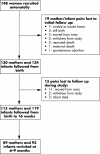Maternal recall of exclusive breast feeding duration
- PMID: 12937095
- PMCID: PMC1719625
- DOI: 10.1136/adc.88.9.778
Maternal recall of exclusive breast feeding duration
Abstract
Background: Both the pattern and duration of breast feeding are important determinants of health outcomes. In vertical HIV transmission research, reliable documentation of early breast feeding practices is important in order to correctly attribute postnatal transmission to feeding pattern.
Aims: To validate methods of collecting data on the duration of exclusive breast feeding (EBF) in an area of South Africa with a high HIV prevalence rate.
Methods: A total of 130 mothers were interviewed weekly, postnatally. At every interview a 48 hour and a seven day recall breast feeding history were taken. A subset of 70 mothers also received two intermediate visits per week during which additional 48 hour, non-overlapping, recall interviews were conducted. Ninety three infants were revisited at 6-9 months of age when mothers' recall of EBF duration from birth was documented. The different methods of recalling EBF status were compared against an a priori "best comparison" in each case.
Results: Reported breast feeding practices over the previous 48 hours did not reflect EBF practices since birth (specificity 65-89%; positive predictive value 31-48%). Six month EBF duration recall was equally poor (sensitivity at 2 weeks 79%; specificity 40%). Seven day recall accurately reflected EBF practices compared with thrice weekly recall over the same time period (sensitivity 96%, specificity 94%).
Conclusions: 48 hour EBF status does not accurately reflect feeding practices since birth. Long term recall data on EBF are even more inaccurate. We recommend that data on duration of EBF be collected prospectively at intervals of no longer than one week.
Figures
Similar articles
-
Calculating Exclusive Breastfeeding Rates: Comparing Dietary "24-Hour Recall" with Recall "Since Birth" Methods.Breastfeed Med. 2016 Dec;11:514-518. doi: 10.1089/bfm.2016.0032. Epub 2016 Sep 28. Breastfeed Med. 2016. PMID: 27682311
-
Improved rates of exclusive breastfeeding at 14 weeks of age in KwaZulu Natal, South Africa: what are the challenges now?BMC Public Health. 2018 Jun 19;18(1):757. doi: 10.1186/s12889-018-5657-5. BMC Public Health. 2018. PMID: 29914417 Free PMC article.
-
Exclusive Breastfeeding Is More Common Among HIV-Infected Than HIV-Uninfected Kenyan Mothers at 6 Weeks and 6 Months Postpartum.Breastfeed Med. 2017 Jun;12:283-289. doi: 10.1089/bfm.2016.0126. Epub 2017 May 3. Breastfeed Med. 2017. PMID: 28467097
-
Exclusive breast feeding (EBF) in Jordan: prevalence, duration, practices, and barriers.Midwifery. 2014 Mar;30(3):331-7. doi: 10.1016/j.midw.2013.01.005. Epub 2013 Feb 26. Midwifery. 2014. PMID: 23484776
-
[Breastfeeding in Africa: will positive trends be challenged by the AIDS epidemic?].Sante. 2002 Jan-Mar;12(1):64-72. Sante. 2002. PMID: 11943640 Review. French.
Cited by
-
Challenging the utility of 24-hour recall of exclusive breast feeding in Japan.BMJ Glob Health. 2023 Dec 7;8(12):e013737. doi: 10.1136/bmjgh-2023-013737. BMJ Glob Health. 2023. PMID: 38084493 Free PMC article.
-
Complementary feeding adequacy in relation to nutritional status among early weaned breastfed children who are born to HIV-infected mothers: ANRS 1201/1202 Ditrame Plus, Abidjan, Cote d'Ivoire.Pediatrics. 2006 Apr;117(4):e701-10. doi: 10.1542/peds.2005-1911. Pediatrics. 2006. PMID: 16585284 Free PMC article.
-
Models using private general practitioners to provide caesarean deliveries at five South African district public hospitals: insights for public-private contracting for obstetric care in rural areas.Glob Health Action. 2023 Dec 31;16(1):2241811. doi: 10.1080/16549716.2023.2241811. Glob Health Action. 2023. PMID: 37552135 Free PMC article.
-
A controlled study on baby-friendly communities in Italy: methods and baseline data.Breastfeed Med. 2013 Apr;8(2):198-204. doi: 10.1089/bfm.2012.0130. Epub 2013 Feb 11. Breastfeed Med. 2013. PMID: 23398142 Free PMC article. Clinical Trial.
-
Time trends and determinants of breastfeeding practices among adolescents and young women in Nigeria, 2003-2018.BMJ Glob Health. 2020 Aug;5(8):e002516. doi: 10.1136/bmjgh-2020-002516. BMJ Glob Health. 2020. PMID: 32764127 Free PMC article.


